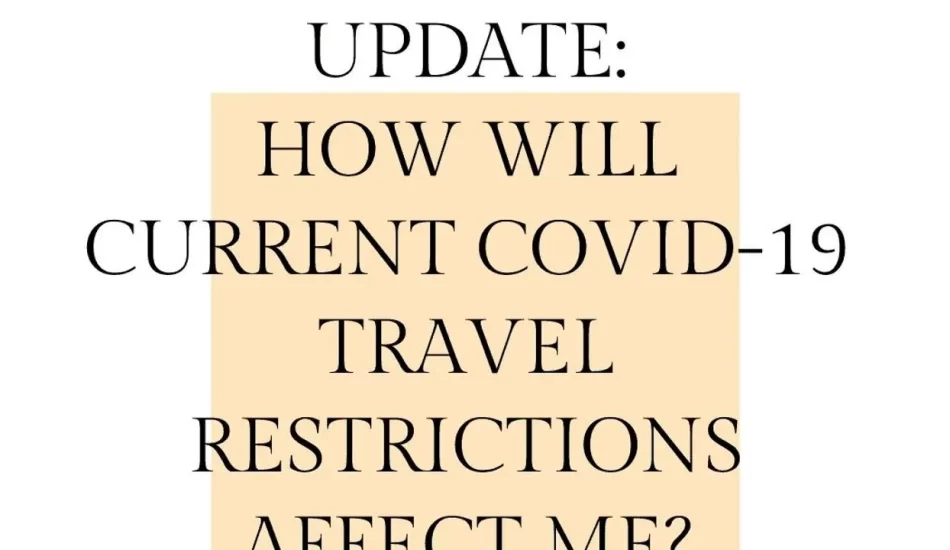Traveling During the COVID Pandemic: What You Need to Know

How do the current travel restrictions and immigration suspensions related to COVID-19 affect my travel and immigration options?
In general, given present public health concerns, all non-essential travel is strongly discouraged.
All non-essential international travel is strongly discouraged according to the current Global Level 4 Health Advisory (Do Not Travel). Check here for the most up-to-date travel advisory changes from the U.S. Department of State. The northern and southern borders of the U.S. are currently closed to all non-essential travel until July 21, 2020, pending further extension, but essential travel related to work, including work related to supply chains, is continuing as normal. Keep in mind that each country will have their own detailed guidelines in place in order to limit non-essential travel during the COVID-19 pandemic.
Non-essential domestic travel is also discouraged at this time. Within the U.S., each state has its own guidelines for travel within and between U.S. states. Check the guidelines for your state here.
U.S. citizens, lawful permanent residents, and their direct family members can return home to the U.S. from abroad.
Currently, entry into the U.S. is banned for foreign nationals of the countries listed below, but these restrictions do not apply to U.S. citizens, lawful permanent residents (LPRs), nor the spouse, child (under the age of 21), parent (provided that his/her U.S. citizen or LPR child is unmarried and under the age of 21), or sibling (provided that both the sibling and the U.S. citizen or LPR are unmarried and under the age of 21) of a U.S. citizen or lawful permanent resident. If you fall into one of the above categories, you will be able to enter the U.S. through a specially designated airport, even if you have recently spent time in one of the following countries. Once you have entered the U.S. following international travel, it is strongly recommended that you quarantine yourself in your home for 2 weeks to avoid spreading COVID-19.
China
Iran
European Schengen area (Austria, Belgium, Czech Republic, Denmark, Estonia, Finland, France, Germany, Greece, Hungary, Iceland, Italy, Latvia, Liechtenstein, Lithuania, Luxembourg, Malta, Netherlands, Norway, Poland, Portugal, Slovakia, Slovenia, Spain, Sweden, Switzerland, Monaco, San Marino, Vatican City)
United Kingdom (England, Scotland, Wales, Northern Ireland)
Republic of Ireland
Brazil
Certain direct family members of U.S. citizens are exempt from recent executive orders suspending the issuance of various immigrant and non-immigrant visas.
As recently announced by the Trump administration, certain immigrant and non-immigrant visas are suspended until December 31, 2020. On April 22, a temporary suspension was placed on immigrant visas. There are exceptions, however, for various individuals, including spouses of U.S. citizens and children of U.S. citizens, provided the children are unmarried and under the age of 21. On June 22, the suspension was expanded to include various non-immigrant visas and all suspensions were extended through the end of the year. Read more about the suspension of nonimmigrant visas here. For both immigrant and nonimmigrant visa suspensions, those who are already in the U.S. or already possess a valid visa are exempt from the executive orders.
Other individuals with a valid travel document or nonimmigrant visa
Those who already possess approved Advance Parole documents are also exempt from current suspensions and restrictions.
If you are here in the U.S. on a temporary nonimmigrant visa and your legal status in the U.S. is running out, but you are unable to return to your country of citizenship due to COVID-19, you may be eligible for an Extension of Stay or Change of Status through forms I-129 or I-539. USCIS is currently accepting certain late applications if related to extenuating circumstances surrounding COVID-19.
If your time as a visitor in the U.S. is running out, and you were admitted through the Electronic System for Travel Authorization (ESTA) Visa Waiver Program (VWP), read here to see what your emergency extension options are.
Get in touch with us if you have questions about how any current travel restrictions or visa suspensions related to COVID-19 may affect your immigration case.
